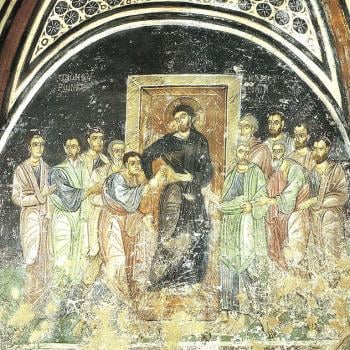God’s omnipotence transcends human ability to comprehend it. When we think about it, contemplating its implications, we find ourselves confronted with paradoxes which show the failing of human logic instead of the failing of the notion of omnipotence.
Human logic is a construct, based upon how humans see, view, experience and understand the world. It is a tool which is beneficial when used properly, and so can point us to various truths, but when its limitations are not understood, when it is believed to be absolute instead of the convention which it is, then people end up abusing it and leading themselves astray. This is why so many, when contemplating categories which transcend human experience, and try to place them under the category of human logic, end up rejecting truth instead of seeing the limitation lies in human logic which often ends up creating antinomies which must be embraced. This is true in regards the notion of omnipotence, for when people contemplate it, engage it with questions, and try to reason it out based upon the human experience, and so with a human logic, they end up dragging transcendent truths into the limited domain of discursive reasoning. Their objections become, as it were, a categorical failure, similar to the way those whose only experience was of two-dimensions would find themselves engaging several paradoxes if they tried to engage four or five dimensions within the confines of only the two dimensions they knew and understood.
![Krishna's Butter Ball by By Viswa2625 (Own work) [CC BY-SA 3.0 (http://creativecommons.org/licenses/by-sa/3.0)], via Wikimedia Commons](https://wp-media.patheos.com/blogs/sites/637/2017/03/Krishnas_Butter_Ball_Mamallapuram-300x225.jpg)
Some argue that the question is meaningless because the question is self-contradictory, and omnipotence relies upon doing all things which are possible. That is, those who object to the question say that omnipotence is based upon the ability to do any potential thing, while internal contradictions are by definition, without potency. While there might be some validity in this response, we can still consider whether or not the internal contradictions are necessary or merely based upon the limitations of human logic. If it is the former, then this response has some validity, but if it is the latter, which it is in this case, then it is a mere deflection. What we must do is follow Kant and others like him who recognize that we can begin logical analysis, not just with God but with many other aspects of the truth, and lead to two conflicting but necessary conclusions, producing antinomies, which must both be true despite appearing to contradict each other.
This is why, to the question of whether or not God can make a stone which he cannot move, the answer must be yes, and yet it must be yes in a way which he also is able to move it. That is, he is able to make the stone, he is able to make a stone which he cannot move while at the same time still hold the ability to move it within himself. Omnipotence here allows for both, God can make a stone which he cannot move, and yet not lose his omnipotence and so still be able to move it. He makes the stone and is capable of moving it in one fashion of his omnipotence, and can make it so he cannot move it, in another act of his being. That is what is necessary, and God, in his omnipotence, is able to do this. Indeed, to realize this is the secret of the Christian faith, for it is the realization that in the incarnation, God proves his omnipotence.
What we must say, therefore, is God is be able to make himself weak in order to verify his greatness, his omnipotence, while at the same time, not losing his omnipotence. It is in making himself weak, he proves his omnipotence, for it proves he is capable of doing what seems to be absurd in human logic, and yet he does so a divine manner which allows him to remain omnipotent and so, paradoxically, capable of moving the stone.

















